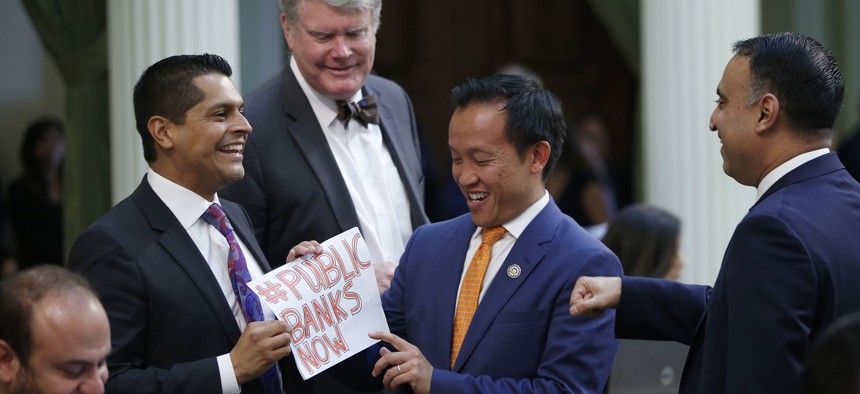California Local Governments Gain a Pathway to Establish Public Banks

Assemblyman Miguel Santiago left, presents Assemblyman David Chiu, third from left, a note reading #PUBLIC BANKS NOW after Chiu's measure to let California cities create public banks, was approved by the Assembly on Sept. 13, 2019. AP Photo/Rich Pedroncelli

Connecting state and local government leaders
Cities and counties would be able to create up to 10 public banks where governments could deposit money under a bill the state's governor signed into law this week.
Legislation that California Gov. Gavin Newsom signed into law this week clears the way for cities and counties to form and own public banks, an idea that has drawn interest in recent years both in and out of the state, while also spurring opposition from the banking industry.
The law authorizes local governments in California to deposit their money in public banks and to invest in them as well. Supporters say localities are currently forced to deposit their money in large out-of-state banks that prioritize profits rather than local priorities.
Public banks, they contend, would be better positioned to offer financing with attractive interest rates for things like public infrastructure projects, affordable housing and small businesses.
Boosters also say the banks would provide local governments with a way to move their money out of private financial institutions that make investments in businesses that people in those communities find controversial, like private prisons and oil companies.
“The public’s money should be used for the public good,” said Assemblyman David Chiu, a San Francisco Democrat who was one of the lead authors of the legislation—Assembly Bill 857. “We finally have the option of reinvesting our public tax dollars in our local communities instead of rewarding Wall Street’s bad behavior.”
But the notion of states and cities getting into banking has elicited blowback from banking industry groups who argue that public banks aren’t needed. They say these institutions could put taxpayer dollars at risk and might harm community banks by siphoning away deposits.
“We are disappointed that the governor signed AB 857,” The California Bankers Association said in a statement. “Californians are not clamoring for a public bank option.”
“We remain opposed to the concept of public banks, and hope that community leaders and elected officials will take note of the risks associated with establishing a municipal bank, before opting to explore this unnecessary and unwanted public option,” the group added.
North Dakota is currently the only state that has a public bank. It was founded in 1919.
Public banks in California would not be allowed to offer retail banking services that are already available where they’re operating, although they could partner with a private bank or credit union to do so—the goal here is to keep the banks from competing with local financial institutions.
AB 857 itself does not establish any public banks. But it outlines a process where local governments could set them up if they gain approval from state regulators and the Federal Deposit Insurance Corporation. The banks would need FDIC deposit insurance.
Under the bill, which goes into effect in January, California’s commissioner of business oversight could not issue more than two public bank licenses in a given year. Local governments would be allowed to create a total of 10 banks.
So-called charter cities would not need voter approval to go through the process of setting up a bank. These 121 cities include the 10 largest cities in the state. They have adopted their own charters and have greater authority in California to manage their municipal affairs.
Task forces in places like San Francisco, Washington state and Santa Fe, New Mexico have explored the idea of public banking in the decade since the Great Recession. But no states, cities or counties have acted to start their own bank during that time.
Los Angeles voters shot down a ballot measure last November that would have allowed for a city-owned bank there. But L.A.’s City Council passed a resolution in support of AB 857.
In total, elected officials in 17 cities and counties, including Oakland, San Francisco and San Diego, endorsed the bill, according to the California Public Banking Alliance.
“There is no question about it, public banking is an idea whose time has come,” San Francisco Supervisor Sandra Lee Fewer said earlier this year.
A Seattle-area state lawmaker has been pushing a proposal for a state-chartered public bank in Washington for a number of years now. Researchers in the state have recently studied the idea, but it has not yet gained any serious momentum in the legislature.
The Public Banking Institute, a think-tank and advocacy group, said that since 2010 there has been legislation introduced in nearly half of U.S. states to create public banks.
Bill Lucia is a Senior Reporter for Route Fifty and is based in Olympia, Washington.

NEXT STORY: After Amazon’s HQ2 Retreat, New York State Lawmakers Target ‘Corporate Welfare’





